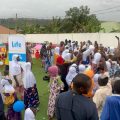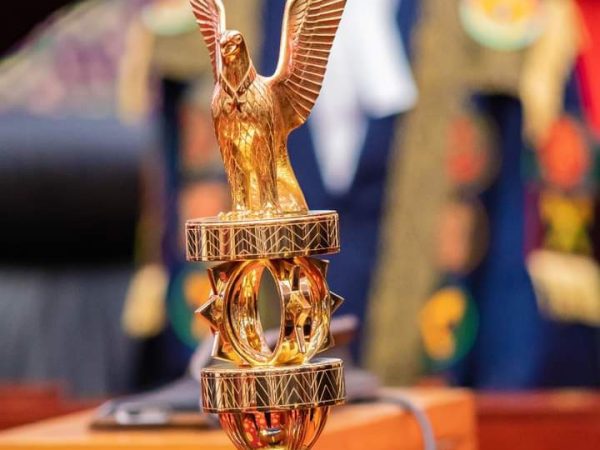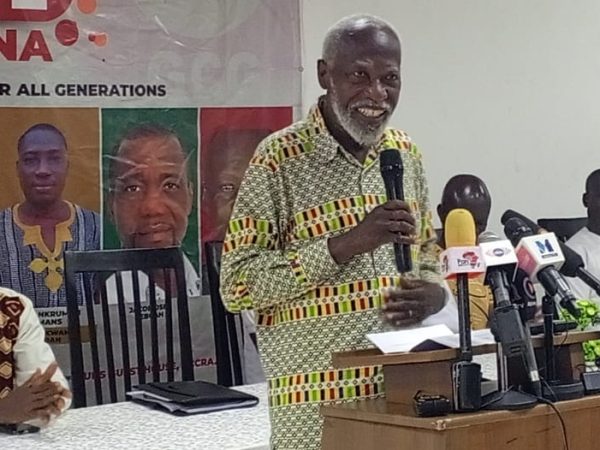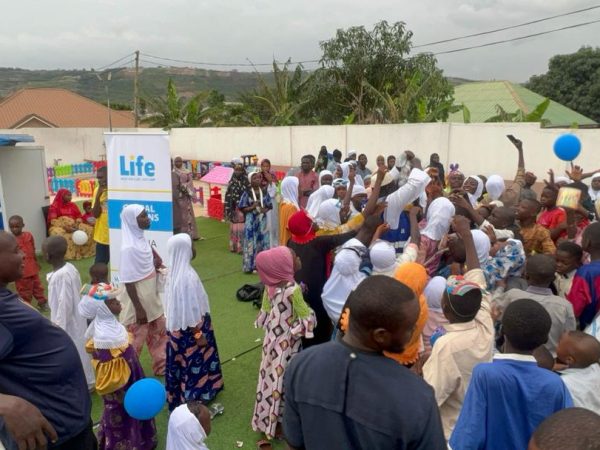Flood waters are no respecter of socio-economic status-Dr Zanetor warns Govt
The Member of Parliament (MP) for Klottey Korle Constituency, Hon Dr. Zanetor Agyemang-Rawlings has called on the government to stop paying lip services on the Odawna storm drain project and execute it to save lives.
According to her, the recent downpour in the city has exposed the nation’s helpless situation as flood water took every part of the capital city and destroyed property and affected many lives.
Dr. Zanetor who is a Deputy Ranking of the Defence and Interior Committee of Parliament made the call in a statement delivered on the floor of Parliament on Thursday, June 2, 2022.
The recent rains she said have affected many of her constituents, especially market women and traders in and around Adabraka Sahara, Odawna, and parts of Asylum-Down, leaving many of them helpless after the rains and water floods.
“Mr. Speaker, these are the hardworking women who put food on our tables and yet are the hardest hit with hardly any buffers in place to support them when these disasters occur. Many of their small businesses are still reeling from the effects of the lockdown and disruption to the supply chain, and then to have been hit by two major floods in less than 72 hours is simply too much!! Walking into various homes and shops in the affected areas and seeing how resolute people were to rebuild as quickly as possible made me wonder what all the taxes we pay are for if at such a time as this, our most vulnerable in society are left to their own devices with no hope of relief from the government that is only too happy to impose taxes penalise people for not paying taxes.”
“The emotional anguish that people were feeling in the aftermath of the flood was tangible, and the feeling of hopelessness was hard to overcome as people kept asking when this problem would be resolved by the government.

“I went round my constituency to assess the level of damage and interact with constituents who had been affected; it was once again obvious that the flood waters are no respecter of Socio-economic status, partisanship, or age group,” Dr. Zanetor recounted the plight of her constituents in flood prone areas.
She, however, urged the government to resources agencies responsible, especially NADMO and others to provide relief support to victims, while planning a medium to long term solutions to the perennial floods situation.
“Mr. Speaker, as a nation that claims not to leave anyone behind, we need to look back every now and then to see those who keep falling with no one there to help them. We have agencies like NADMO that are supposed to provide relief for victims of disasters, but surely fixing the problem would be cheaper in the long run!
“If the government could come up with COVID relief packages for Hotels and Big businesses, surely, it should be able to support the victims, over 70% who are in the informal sector which as we know contributes over 30% of our GDP. It does not speak well of us, as a nation when our most vulnerable are left to struggle back on their feet, while those who are well to do rather seem to be the beneficiaries of grants and loans.”
“Mr. Speaker, I hope that whatever resources can be mobilized to support the affected persons and start the engineering work to improve the drainage and waste management systems should be with greater urgency than we are seeing. Furthermore, the recommendations made by the Auditor General should be taken seriously by the government and implemented if any impact is to be made on the devastating effects of rainfall, she added.

She explained that “A lot of the solid waste is from upstream- other more affluent communities, some of which are in other constituencies. Some of the solid waste that ends up in Klottey Korle comes from as far as Aburi and it’s washed into low-lying areas as the water finds its way into the sea. With no structures in place to trap solid waste in our drains, islands of plastic and other solid waste always get washed into Klottey-Korle when it rains. The rubbish that enters the sea is washed back into the lagoon when the tide comes in. So, when people throw rubbish in our waterways, thinking that they have gotten rid of their problem, it flows downstream and becomes a major sanitation issue for other communities. Single-use plastics, poor segregation of waste, inadequate recycling and garbage collection… the impact on poorer communities is disproportionate in relation to the amount of waste they generate. The Assemblies must pursue their integral role in the sanitation drive in a holistic and integrated manner.”
Other MPs who contributed to the statement bemoaned the situation and called on the government to take bold steps to execute the storm drain project to reduce the impact.
Former Minister of Works and Housing, Samuel Atta Akyea said the flood situation need financial investment which would cost the nation but cautioned that, if the nation fail to take pragmatic steps to provide a long-term solution, the capital city would one day be submerged in the sea completely.
Below Full Statement of Dr. Zanetor
STATEMENT ON THE DEVASTATING EFFECT OF THE RECENT FLOODS IN ACCRA BY DR ZANETOR AGYEMAN-RAWLINGS, MEMBER OF PARLIAMENT FOR KLOTTEY-KORLE AND DEPUTY RANKING MEMBER ON THE SELECT COMMITTEE ON DEFENCE AND INTERIOR
Mr. Speaker, I thank you for the opportunity to make a statement on the recent flooding that occurred in some parts of Accra including Odawna, Abossey Okai, Kaneshie, Dansoman, Kwame Nkrumah Interchange, Alajo and Agbogbloshie, which left many homeless and stranded, left vehicles submerged under several feet of water and washed away the produce of countless market women and traders. Year after year, same period, same problem. When will this finally be resolved?
On the night of Saturday 21st May, there was a heavy downpour, which had those of us in low-lying areas frightened, and then came the rainfall of Monday, the night of 23rd May 2022, which exacerbated the level of angst and extent of damage already left in the wake of the previous rains. The levels the water reached was as high as 6 feet above ground level in some areas
Mr Speaker, statements in relation to flooding on the floor of this House have become a perennial event for lamenting but seem not to have not gained as much traction as one would hope for in the affected areas. Seven years after the June 3rd Disaster in 2015, the same disappointing story can be told ad na useam. The impact on the economic, social, and even mental health status of victims of the flooding is beyond what is easily perceived.

The causes of the flooding both climate related and manmade, include but are not limited to poor planning, building in waterways, lack of reservoirs, reduced green areas for water to seep into the soil, increased population density with inadequate drainage capacity and of course the discarding of solid waste (especially plastics) in our waterways. Furthermore, the Performance Audit Report of the Auditor-General’s On Provision Of Flood Control Drains By Hydrological Services Department Of The Ministry Of Works & Housing (9 July 2021) indicated that the Hydrological Services Department (HSD) of the Ministry of Works and Housing invested over 117.7 million cedis within 5 years (2015-2019) to construct 110 kilometres of drains to tackle flooding, but to date, only 12km (11%) have been done. The report also indicated that the HSD did not construct any of the retention ponds targeted for 18 drainage basins and to make matters worse, out of the 27 drainage projects, 15 had engineering defects that contributed to the flooding. According to the report, the main causes of flooding across the country could be attributed to defective drains, poor maintenance of existing drains and failure to execute targeted drainage projects.
I went round my constituency to assess the level of damage and interact with constituents who had been affected; it was once again obvious that the flood waters are no respecter of Socio-economic status, partisanship, or age group.
My visit to the Odawna market for instance was so heart-wrenching as the women, many of whom are single mothers like myself, had to pull themselves together as they tried to salvage what was left of their produce and other items that they were selling. Mr Speaker, to see elderly women in their seventies lamenting about the loans they had taken to purchase the goods they were selling and wondering how they were going to repay loans for items they had not sold, knowing that the bank would be coming round on a weekly basis to collect their debts was simply heart-wrenching.
Mr Speaker, these are the hardworking women who put food on our tables, and yet are the hardest hit with hardly any buffers in place to support them when these disasters occur. Many of their small businesses are still reeling from the effects of the lockdown and disruption to the supply chain, and then to have been hit by two major floods in less than 72 hours is simply too much!! Walking into various homes and shops in the affected areas and seeing how resolute people were to rebuild as quickly as possible made me wonder what all the taxes we pay are for, if at such a time as this, our most vulnerable in society are left to their own devices with no hope of relief from the government that is only too happy to impose taxes penalise people for not paying taxes.
The emotional anguish that people were feeling in the aftermath of the flood was tangible, and the feeling of hopelessness was hard to overcome as people kept asking when this problem would be resolved by the government.
Mr. Speaker, this house in 2019 approved an amount of two hundred million US Dollars for the Greater Accra from the World bank for the (GARID) Greater Accra Resilient and Integrated Development Project. This was meant to cover a period from 2020 to 2025. The Minister for Works and Housing at the time, Hon. Samuel Atta-Akyea, assured the house that the project would begin in October 2020. Unfortunately, this did not happen, and once again June 2021, the current Minister for Works and Housing, Hon Asenso-Boakye assured the House that the project would begin by December of 2021. We are in May 2022, and ironically the flooding is even worse now. Two years after the funding was approved in Parliament, we are still waiting for the Greater Accra Resilient and Integrated Development Project to be implemented.
In 2020, an amount of 65 million US Dollars was realigned from the GARID Project to the Covid fund, and as of 29th June 2021, this money had not been released to GARID as confirmed by the Minister for Works and Housing, Hon Asenso-Boakye during Question Time on the floor of parliament (June 2021).
The Odaw river marks the Western border of my constituency, Klottey-Korle, which means that a significant aspect of this project covers the Korle-Klottey Municipality.
In Klottey -Korle, flooding affects several of our electoral areas, namely, Adabraka North, Adabraka Official Town, Asylum Down, Odawna, Osu Doku and even some parts of Osu Kinkawe. Mr Speaker, even houses that hitherto were not affected by flooding, are now at risk and many people had to spend the entire night and the following day scooping contaminated water out of their homes.
Unlike people who are in the middle and upper Socio-economic levels, most of the hardworking persons who are mostly affected by the floods do not have the relevant shock absorbers in place to cushion them from the devastating effects of the floods. In the aftermath of the June 3rd 2015 disaster, many residents complained that most of the insurance companies had refused to cover their goods and properties based on their geographical location which basically meant they had nothing to fall back on.
As a nation that claims not to leave anyone behind, we need to look back every now and then to see those who keep falling with no one there to help them. We have agencies like NADMO that are supposed to provide relief for victims of disasters, but surely to fix the problem would be cheaper in the long run!
If the government could come up with COVID relief packages for Hotels and Big businesses, surely, it should be able to support the victims, over 70% of who are in the informal sector which as we know contributes over 30% of our GDP. It does not speak well of us, as a nation when our most vulnerable are left to struggle back on their feet, while those who are well to do rather seem to be the beneficiaries of grants and loans.

Mr Speaker, I hope that whatever resources can be mobilized to support the affected persons and start the engineering work to improve the drainage and waste management systems should be with greater urgency than we are seeing. Furthermore, the recommendations made by the Auditor General should be taken seriously by the government and implemented if any impact is to be made on the devastating effects of rainfall.
I thank you for the opportunity.
Source: expressnewsghana.com
Send your news articles to expressnewsgh@gmail.com or via WhatsApp 0543900732







